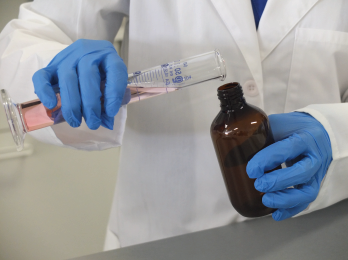Prescriber Hub
What is Compounding, How Does It Work?
Pharmaceutical compounding is the science responsible for the creation of compounded medication. Pharmacists, supported by their technical team, combine, according to precise instructions, the ingredients necessary to obtain a medication in the exact strength and dosage form required by the patients and their own unique needs. It may include creams, ointments, liquids, capsules and many others. Personalised medicine is a convenient way for a physician to individualise a treatment according to their patients’ specific needs. It also makes it possible to create a drug accessible in a form that is not commercially available.

What are the Benefits of Compounding?
Compounding offers a number of benefits, many of which relate to the creation of customised pharmaceutical products to meet the unique needs of patients when standard marketed drugs fail to do so.
Compounding is often required for medical reasons; some patients require a particular non-essential ingredient to be removed from their medication to prevent an allergic reaction. Others require compounded medication to acquire an exact dosage amount that is unique to their own personal needs, and which may not be available in the available marketed drugs.
Compounding in pharmacy is also used to offer a variety of options to patients who have to receive their medications in a particular form. For example, in certain cases, children or elderly people face difficulties consuming oral medication in capsule form. Compounding pharmacists can then provide the same medication in a different form such as cream base, syrup or solution form for easier administration. In addition, compounding is also used to change the taste and color of medications, to make it more palatable and aesthetically appealing to patients, especially with children and even animals.
Who Prepares Compounded Medications?
Compounded medications are ordered by a licensed physician, veterinarian or other prescriber, and must be mixed in a safe and carefully controlled environment by a licensed personalised medicine pharmacist.

History of Compounding
As the process of combining different agents began in its simplest form before the term compounding ever existed, it is difficult to determine the precise moment of its creation. However, the art of personalised medications can be linked to the origins of pharmacy itself and the first documented chemical processes can be traced as far back as the time of the Egyptians.
The Pharmaceutical Compounding Revolution Over the Years
Originally, it was common practice for physicians to both prescribe and compound a patient’s medication themselves. It was only at the end of the 19th century that a clear distinction emerged between the role of physicians and pharmacists.
In the early 1900’s, the majority of all medications were still the result of personalised medicine. Although the traditional role of the targeted care pharmacist had faded away with the introduction of standardised manufacturing processes for large volumes of medicines from the 1950s, a few pharmacists retained this expertise. Since the 1990s, there has been a renewed demand for pharmaceutical compounding.
Today, the compounding pharmacy industry is experiencing resurgence as the importance of custom-made medications becomes more prevalent. The demand for individualised prescription medication is on the rise, as drug manufacturers do not always meet the distinct requirements of each patient. As always, individualised care pharmacists are there to provide targeted solutions to their patients’ unique needs.
Commonly Prescribed Formulations
LifeCare supplies condition-specific formularies to assist prescribers in gaining information about how to prescribe a compounded solution, and to act as a prescribing guide.
As compounds are created on an individual patient basis, prescribers are encouraged to contact our pharmacists to discuss the best options for each unique patient story. Below are some commonly suggested formulas.
C01 Dental Prescribing
C02 Podiatry Prescribing
C03 Pain Prescribing
C04 Veterinary Prescribing
C05 Men's Health Prescribing
C06 Women's Health Prescribing
C07 Dermatology Prescribing

